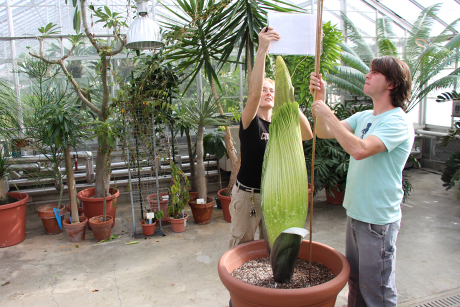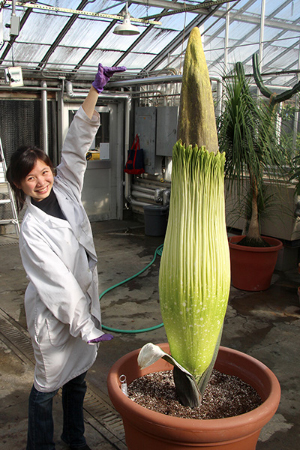Cornell's rare corpse plant to bloom … again
By Krishna Ramanujan

Though a rose smells sweet no matter what it is called, Cornell’s rare corpse plant stinks like rotting flesh in spite of its many names.
Also known as titan arum (Amorphophallus titanum), the plant bloomed for the first time in March 2012, attracting more than 10,000 visitors over five days and is expected to bloom again in the next five to eight days.
The new bloom offers an opportunity for those who missed a glimpse of the last flowering, which took place over spring break.
Cornell’s titan arum, affectionately dubbed “Wee Stinky,” drew so much interest during the 2012 bloom partly because the plant’s flower is large and spectacular – reaching heights of up to three meters. Its scent is, well, unusual, and the corpse plant’s bloom has only been recorded about 140 times in cultivation.

Cornell’s College of Agriculture and Life Sciences will set up viewing times for the public at the Kenneth Post Lab’s Green Greenhouse 114 on Tower Road, where the plant lives. A titan arum blog will be updated live with information about the viewing schedule, photos and posts.
An open house for viewing Wee Stinky starts Friday, Nov. 14, from 9 a.m. to 4 p.m. and will continue during those hours over the weekend. Once the plant blooms there will be extended viewing hours, to be announced on the college’s Twitter feed and the titan arum blog. The Cornell Dairy Store will feature a “Wee Stinky Latte” and will follow these hours of operation to celebrate the bloom: Nov. 16, 9 a.m. to 3 p.m., and Nov. 17-19, 7:30 a.m. to 9 p.m.
“It has a terrible smell that only lasts for a couple of days, but the flower will be fully open for about three days” before it withers, said Paul Cooper, head grower for the Liberty Hyde Bailey Conservatory Collection.
Cornell acquired a year-old seedling in 2002 that grew into Wee Stinky. A plant grown from seed takes seven to 10 years to bloom for the first time. But after that, a healthy plant could bloom again every few years.
Plant and animal science ranked No. 1
In October, Cornell was ranked the best global university for plant and animal science by U.S. News and World Report.
The ranking comprised the fields of plant research, plant pathology, plant nutrition, veterinary medicine, marine and freshwater biology, and zoology; and was based on global and regional research reputation, international collaboration, publications and frequency of highly cited papers, among other indicators.
“This is an incredibly exciting achievement, and a recognition of the outstanding efforts of our faculty and staff in these disciplines,” said Kathryn J. Boor, the Ronald P. Lynch Dean of the College of Agriculture and Life Sciences.
“There is still a lot we don’t know about titan arums,” said Cooper. As a result, Robert Raguso, professor and chair of the Department of Neurobiology and Behavior, and students will collect data on the plant during its bloom, a continuation of efforts made during the 2012 flowering to collect data on volatile emissions that give the plant its characteristic odor. The researchers will also try to better understand biological details of the blooming cycle. After the last bloom, Cornell horticulturists generated viable seeds, Cooper said.
Native to the rainforests on the island of Sumatra, titan arum’s strong stench and deep purple color attracts flies for pollination.
Wee Stinky is part of the School of Integrative Plant Science’s Liberty Hyde Bailey Conservatory collection, which is maintained by the Plant Biology Section. The collection is housed in various Cornell University Agricultural Experiment Station greenhouses, while a new conservatory behind the Plant Science building is being constructed.
Media Contact
Get Cornell news delivered right to your inbox.
Subscribe